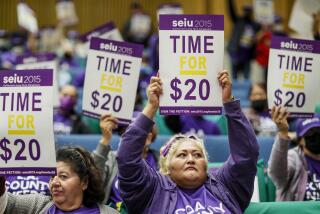Senators Refuse Pay Raise Despite Leaders’ Urging
WASHINGTON — The Senate rebuffed its Republican and Democratic leaders Friday and refused to adopt a pay increase of nearly 40% for senators, despite House approval of an identical hike for representatives, federal judges and top officials of the executive branch.
Senate Majority Leader George J. Mitchell (D-Me.), expressing regret at the development, immediately introduced a bill for smaller raise of 9.7%, to take effect next year, and for the phasing out of speech honorariums on a dollar-for-dollar basis as pay goes up.
Mitchell said that he and his Republican counterpart, Sen. Bob Dole of Kansas, simply lacked the votes to pass the measure, which had the backing of President Bush and seemed likely to get through the Senate.
The development occurred after Mitchell and Dole won a series of procedural votes to block any delay in the vote on the pay raise and to stop a move that would have knocked the pay-raise provisions out of the legislation.
Under Mitchell’s alternative plan, U.S. judges and top officials in the executive branch would get a 7.7% increase next January and a follow-up 25% raise in January, 1991, after the next congressional elections.
Mitchell said that the refusal of the Senate to go along with the bipartisan pay-ethics package would mean that members of the House would be paid more than senators.
The original Senate pay increase proposal was accompanied by a package of ethics reforms, including an unexpected Senate ban on speech honorariums after 1990. Under current rules, senators may pocket up to $35,800 a year in speaking fees.
The Senate bill also contained changes to tighten existing rules on acceptance of expense-paid travel and gifts, to expand financial disclosure and to place restrictions for the first time on lobbying by former members of Congress and their highest-ranking staff aides.
The Senate bill and a nearly identical House measure approved Thursday would increase the annual salary of members of Congress, judges and top Administration officials to almost $125,000 in 1991. The increases are supported by President Bush.
Proponents hoped that voters would not be as incensed about the latest pay raises as they were about a proposed 51% increase voted down in February after radio talk show hosts across the country stirred up widespread public opposition.
The latest attempt to increase congressional pay is expected to be more palatable to the public because it is tied to ethics reforms and because the bulk of the pay increase would not take effect until after next year’s elections.
But, as Senate Minority Leader Bob Dole (R-Kan.) wryly observed about a recent public opinion poll on the issue: “Only 72% are opposed--what are you worried about?”
Foes of the package, however, decried what one critic called “this flap-crap about ethics” designed to divert attention away from the substantial salary increases for lawmakers, whose income already ranks them among the nation’s top 1% of wage earners.
A bipartisan majority crushed attempts by Sen. Jesse Helms (R-N.C.) to delay a vote until next February or to keep senators’ pay at its current level of $89,500.
The Senate acted a day after the House voted 252 to 174 to raise representatives’ pay by the same amount. The House measure also forbids pocketing speech fees, which can provide as much as $26,850 a year in additional income for representatives.
Helms protested in vain that the complex legislation, which filled more than 150 pages, was not made available to senators before the debate began and was being rammed through the Senate before taxpayers had a chance to understand it.
“I implore the Senate not to proceed,” Helms said. “Give the public--the people who pay our salaries--a fair opportunity to make up their own minds.”
But his motion to delay consideration of the pay and ethics proposal until Feb. 1 was defeated by a vote of 88 to 11. Moments later, the Senate voted by an overwhelming 90 to 9 to shut off debate, averting a possible filibuster attempt by the North Carolina lawmaker.
On another amendment to strike the pay increases from the bill and allow the acceptance of speech honorariums to continue, Helms lost on a vote of 65 to 34.
The announcement that the Senate leadership would go along with the House pay-raise formula and a total ban on honorariums came as a surprise in view of the higher limit on earnings from speech-making that senators are allowed to keep.
Dole, who said that he saw nothing wrong with taking as much as $2,000 from private interest groups for making a speech, nevertheless supported the honorariums ban. “Most of us have decided we’d better err on the side of caution,” he said.
Senate Majority Leader George J. Mitchell (D-Me.) said that the House had shown a “sound and rational way to proceed” on a pay and ethics package that also had strong support from President Bush.
Mitchell said that the 51% increase rejected by the Senate and House last February was “too much too soon” and deserved to go down to defeat.
“But not every pay raise deserves to fail,” Mitchell said, noting that Congress’ practice of rejecting cost-of-living increases received by most other federal government employees had caused its pay to lag behind inflation.
And, as Dole noted in the debate, the combination of a 7.7% raise next January, a 25% additional raise a year later, and an undetermined cost-of-living increase in 1991 would not offset the loss of the maximum honorariums income of $38,500 that most senators receive.
“So, it’s a pay cut of $5,000 or $6,000,” Dole said.
Sen. Gordon J. Humphrey (R-N.H.), who described himself as one of the “tightest skinflints” in the Senate, endorsed the increase as long as honorariums were eliminated and the lawmakers had to vote by roll call so they could be held accountable.
More to Read
Get the L.A. Times Politics newsletter
Deeply reported insights into legislation, politics and policy from Sacramento, Washington and beyond. In your inbox three times per week.
You may occasionally receive promotional content from the Los Angeles Times.










